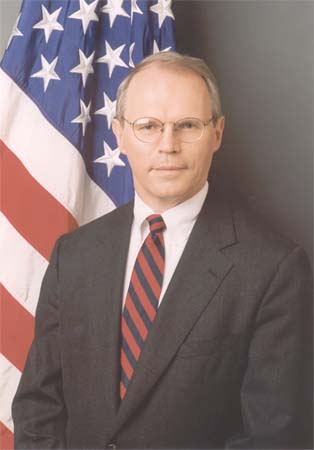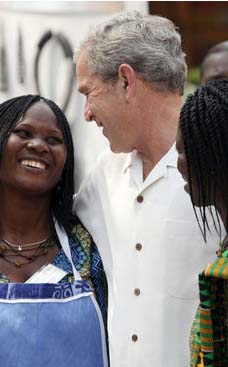
"The Chinese people are very proud of hosting the Olympics. This sense of pride transcends political views within China. Even people who are extremely critical of their own government, and there are many Chinese who are very critical of their own government, even those people are filled with a sense of pride that China is hosting these Olympics. Many of them have taken the view that those who would somehow boycott the Olympics are doing so out of a desire to keep China down and otherwise humiliate and embarrass China. So it is an issue with great public resonance in China, going well beyond the question of the government." Christopher R. Hill, assistant secretary of state for East Asian and Pacific Affairs and former U.S. ambassador to South Korea, served as a Peace Corps Volunteer in Cameroon.
An Interview with Christopher R. Hill
Q&A: Top U.S. diplomat on N. Korean negotiations, China and the Olympics, and American image
By Kristi Heim
Seattle Times staff reporter
U.S. Assistant Secretary of State Christopher R. Hill will be the point man for the U.S. as it makes what may be a final push toward resolving one of the biggest threats to international security: a North Korean nuclear weapon. The Bush administration faces criticism from some for softening the U.S. stance against the rogue nation. But he has weathered challenges before, keeping six-party talks among the U.S., North Korea, South Korea, China, Japan and Russia moving forward.
Negotiating the agreement with North Korea has been the hardest job of his career, he said, one he's eager to put behind him. Hill was in Seattle Wednesday for several appearances, including a talk with students at the University of Washington, where he sat down for a brief interview with The Seattle Times.
Q: Has the issue of North Korea's suspected uranium enrichment and transfer to Syria been resolved?
A: We're looking to try to resolve this so-called second phase. The second phase includes giving us a declaration, and we need a declaration to cover all of these elements — Syria, uranium enrichment and especially plutonium. We made progress in Singapore, but until we get all the elements done, and we're not done yet, we're going to have some more diplomacy next week. I can't tell you whether it's resolved yet.
Q: What are the next steps?
A: We need to make sure that when the North Koreans present their declaration of their plutonium holdings, that it is complete and that we can verify that it's correct. And then there are some other things we need to ensure we have means to monitor and verify that all of these elements are done. So these verifying things are the things we're working on with the North Koreans and other parties in the six parties. I don't want to say I'm optimistic, but I certainly don't want to say I'm pessimistic right now.
What we're trying to do is get to the point where we know precisely what their fissile material holdings are, so when we know precisely whether it's 35 kilos or 45 kilos, we can then have a final phase negotiation where they will abandon or give up that fissile material. But until we get the declaration done, we can't get to that final phase.
Q: What restraints are being put on North Korea's distribution of this fissile material?
A: The good thing about fissile material is it has a signature, so if they ever sold it to somebody, and it was discovered, we would know where it came from. We don't have any indication they have ever proliferated fissile material, but that said, we don't know where it is. We know it's somewhere in North Korea. We don't know the arrangements they have for guarding it. So we have to be very focused on trying to resolve the issue of the fissile material, that is, trying to get them to do what they promised to do in September 2005, which is abandon it.
Q: Is it important to keep any momentum going before a change in the U.S. administration?
A: My sense is there's broad bipartisan support for this step-by-step negotiation we're on. To be sure, there's a lot of criticism of elements of it. Some people have been saying we're going too far too fast. But overall, there's bipartisan support. I don't think a next administration, whether it's Republican or Democrat, would really want to have this issue dropped in their laps. Everyone would like to have it resolved. Whether it can be resolved or not will depend on the North Koreans.
Q: What will you be doing next week?
advertising
A: We're in very close contact with our partners. In fact, the South Korean president is in Washington at the end of this week. We'll be having extensive discussions with the South Koreans on this. We are also in almost daily communication with the Chinese on this.
And beyond that we'll have to see. I think everyone understands that we really should try to have this wrapped up by the end of this month.
Q: Do you think it's possible to open diplomatic relations with North Korea sometime soon?
A: I think in the context of their denuclearization, that would be envisioned.
Q: What would be the time frame?
A: It depends how quickly they are willing to give up their nuclear materials. If they're willing to do it this year, we could establish relations this year.
But we won't have relations with a nuclear North Korea.
Q: How is China looking at the six-party talks?
A: China is a very active participant. It's an area we have succeeded in working with them very productively and pragmatically on an area of mutual concern. China looks at North Korea in very different ways from how we look at them. You have to recall they were a historical partner and ally. Chinese veterans associations trace their roots to the Korean War. All that said, China is very much convinced that North Korea needs to give up its nuclear ambitions. They know that if they don't, you might have a situation where other countries feel they need a nuclear program.
Q: Do they have the same urgency?
A: Chinese always have perhaps a greater sense of patience than we do, except if the subject is Taiwan. But I think we're working in sync. Many Americans think, well, why can't they just cut off the North Koreans, but that's not how they do business with a neighbor. They often use more friendly persuasion than other people feel is appropriate.
Q: You spend a lot of time in Beijing. What is the attitude toward the Olympics and the recent protests surrounding the torch relay?
A: The Chinese people are very proud of hosting the Olympics. This sense of pride transcends political views within China. Even people who are extremely critical of their own government, and there are many Chinese who are very critical of their own government, even those people are filled with a sense of pride that China is hosting these Olympics.
Many of them have taken the view that those who would somehow boycott the Olympics are doing so out of a desire to keep China down and otherwise humiliate and embarrass China. So it is an issue with great public resonance in China, going well beyond the question of the government.
Q: Could protests or potential boycotts push the government toward improving human rights?
A: Analysts have different views. I would say the locus of opinion seems to be efforts of that kind would not result in improved human rights.
Q: Is the U.S. prepared for this growing nationalist sentiment in China? Do we understand it well enough?
A: I would say the China relationship is the most important bilateral relationship we have in the world. We have some 57 dialogues with Chinese counterparts, ranging from global warming to economic and trade issues. I would say we spend a great deal of time and attention on things Chinese with the understanding that in the long run we have to have a good working relationship with 1.3 billion people.
Q: You've made a lot of progress throughout your career in Bosnia, Kosovo and North Korea.
A: Well, come on ... some things went well, other things didn't.
Q: The U.S. image abroad, though, is really at a low point. Does this bother you?
A: I think the concern about the U.S. image abroad is something that shouldn't just concern diplomats, it should concern every American. Every American ought to think what has caused this and what can he or she do to help.
I think some of the issues have to do with fact that America is a country very proud of its achievements, a country that has a story to tell the world and a country that has advice to give the world. I think to some extent Americans in the post-Cold War period have gotten into the habit of providing a greater supply of advice than the demand calls for.
I think just as in people's personal lives, there's sometimes a limit to how much advice you want to take from somebody. Americans might do well to focus on what has really been appealing to people, and that is the example we've set: this robust democracy, this country that has developed individual freedoms in a way that no country in the world has achieved, a country that has developed one of the greatest economies the world has every seen. And to some extent we ought to rely on that example, and allow people to be impressed by that.
With respect to China, I think what is appealing to the Chinese about the United States is precisely that 230-year history. It's not so much anyone's tendency to give them unsolicited advice on what they need to do.
Kristi Heim: 206-464-2718 or kheim@seattletimes.com








